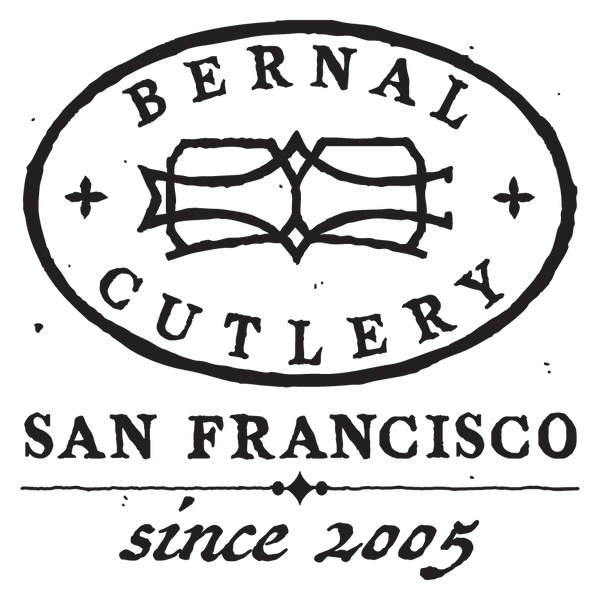-
Currency
-
NEW
- All New Products
- New Kitchen Knives
- New Kitchen Tools
- Latest Vintage
- New Pocket & Outdoor
- New Pantry
-
What's in my Basket Series
- Nite Yun - Lunette
- Scott & Frost Clark - Dad's Luncheonette, Chef & Author
- Angela Wilson - Avedano's
- Susan Kim - Eat Doshi
- Seth Stowaway - Osito
- Dr. Harold McGee - Author
- Ryo Sakai -Kuma Sushi
- Ian McNemar - Woodworker, Instructor
- Anna Voloshyna - Author
- Jorge Martinex Lillard - Lolo´
- Chris Yang - Piglet & Co
- Griffin Wilson - @cabincorn
- Gabe Rudolph - Gestura Utensils
- Molly DeCoudreaux - Food Photographer
- Geoff Davis - Burdell Soul Food
- Jen and Wes - @crazythickasians
- Josh Donald - Bernal Cutlery
- Kelly Kozak - Bernal Cutlery
- Jessica Sullivan - Poppy SF
- Sylvan Mishima Brackett - Rintaro
- Michael Myers - Film Character
- Ali Hooke - @alihooke
- Bruce Hill - The Chef's Press
- Dylan Carasco - Butcher's Guide
- Spencer Horowitz - Hadeem
-
Japanese Knives
- Ashi Hamono
- Gihei Knives
- Godo Tadaharu
- Hatsukokoro
- Hitohira
- Iwasaki Kamisori
- Kaji-Bei
- Kamo Shiro
- Kanehide
- Konosuke
- MAC Knife
- Masakane
- Makoto Tadokoro Marushin
- Morihei
- Myojin Riki Sesakusho
- Nakagawa Hamono
- Naozumi
- Nigara Hamono
- Sakai Kikumori
- Shigefusa
- Tagai
- Takada no Hamono
- Tanabe Tatara
- Tosa
- Tsukasa Hinoura
- Yoshikane
- Yoshikazu Tanaka
- Wakui
-
Global Knives
- Allday Goods (GBR)
- Alma Knife Co. (USA)
- Astral Works (USA)
- Au Sabot (FRA)
- AZ Knives (ARG)
- Benchmade Cutlery (USA)
- Bernal Cutlery (USA)
- Blenheim Forge (GBR)
- Chazeau Honoré (FRA)
- Dexter Russell (USA)
- Eichenlaub Tableware (DEU)
- Florentine Kitchen Knives (ESP)
- Fontenille Pataud (FRA)
- Friedr Herder (DEU)
- J Adams (GBR)
- John Nowill & Son (GBR)
- K Sabatier (FRA)
- Pallares (ESP)
- Roland Lannier (FRA)
- Rolin Knives (USA)
- Silverthorn (USA)
- Steelport Knife Co. (USA)
- Windmühlenmesser (DEU)
- Zirh (TUR)
-
Pocket | Outdoor
- A Wright & Son (GBR)
- Andersson & Copra (SWE)
- Au Sabot Folders (FRA)
- Benchmade (USA)
- Buck Knives (USA)
- David Margrita (FRA)
- Friedr Herder (DEU)
- Fontenille Pataud (FRA)
- Helle (NOR)
- Higonokami
- Hults Bruk Axes (SWE)
- Ibberson (GBR)
- Joseph Rogers & Sons (GBR)
- Kalthoff Axes (SWE)
- MOKI Knives (JPN)
- Morakniv (SWE)
- Opinel (FRA)
- Pallares (ESP)
- Tactile Knife Company (USA)
- Wood Tools (GBR)
- Vintage & New Vintage
-
Styles
- Bernal Cutlery Collaborations
- Knife Sets
- Carving Forks | Knives | Sets
- Japanese Kitchen Knives
- Western Kitchen Knives
- Chinese Style Cleavers
- Bread
- Butchery
- Cheese | Charcuterie
- Pocket | Folding
- Woodworking | Hobby | Craft
- Kamisori Razors
- Table | Steak
- Fixed Blades | Axes | Outdoor Tools
- Scissors | Shears | Snips
- Left Handed
- The Vault
- Vintage
- Sharpening
- Kitchen | Cookware
- Tableware | Service
- Pantry
- Accessories
- Deals
- Gift Cards
- INFO
or
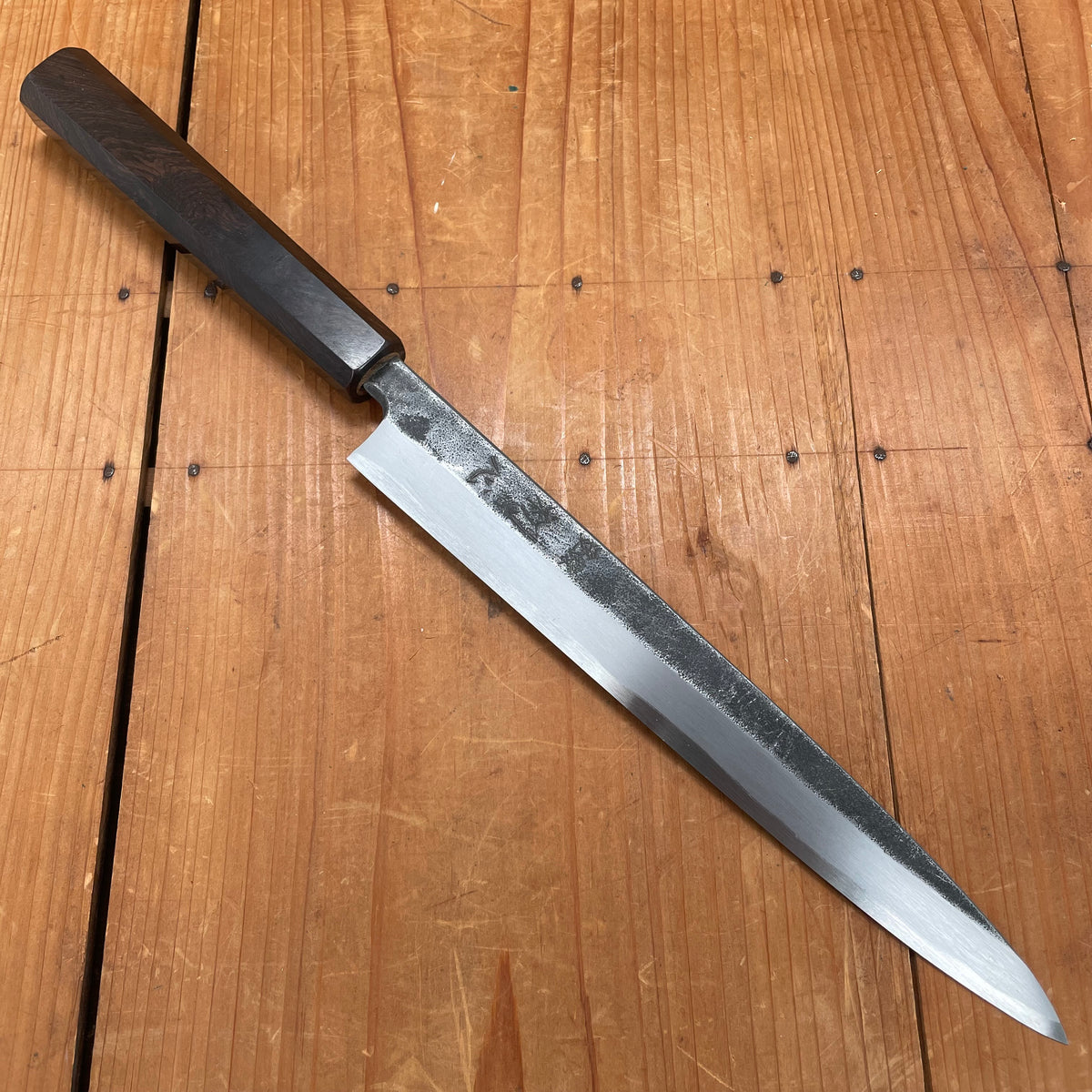
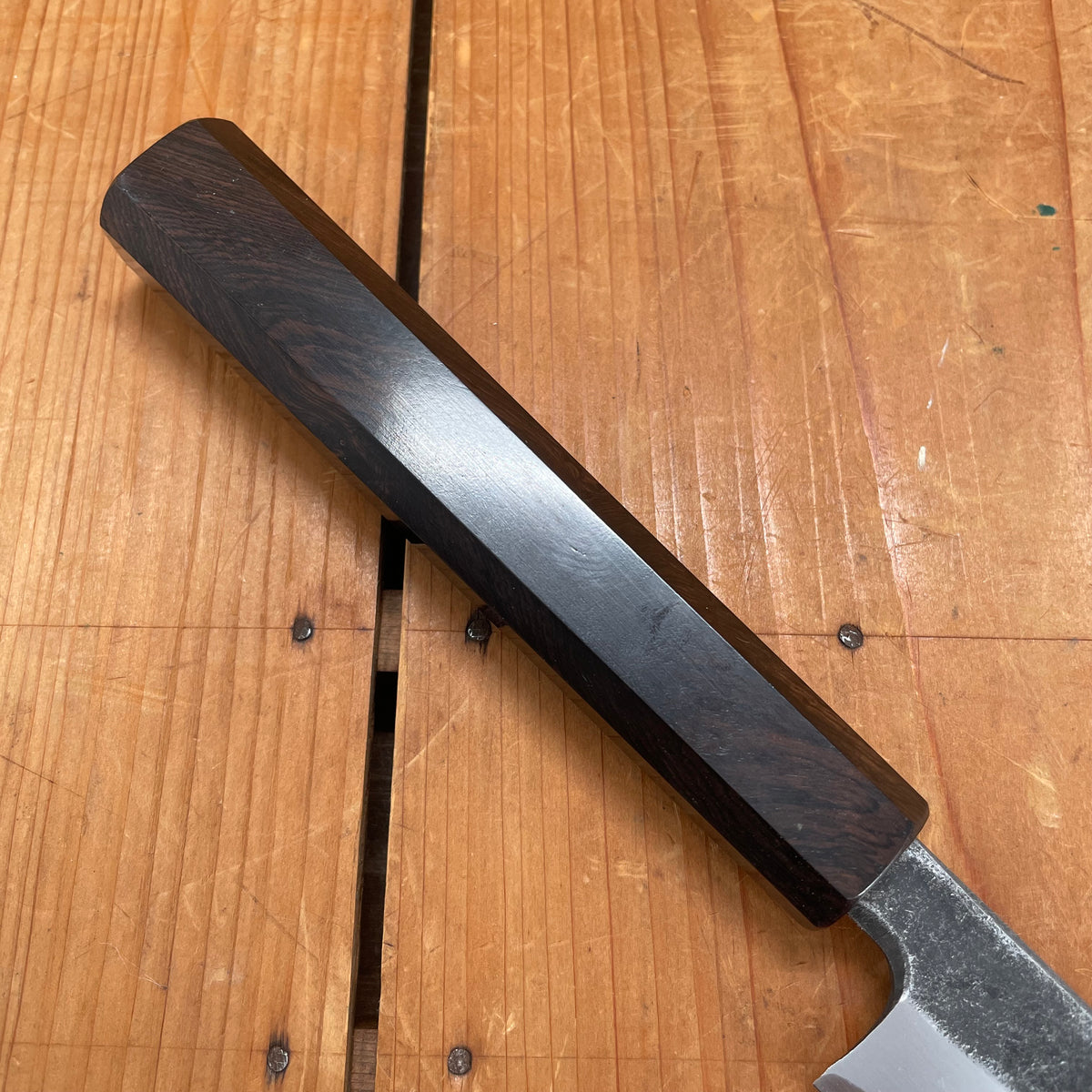
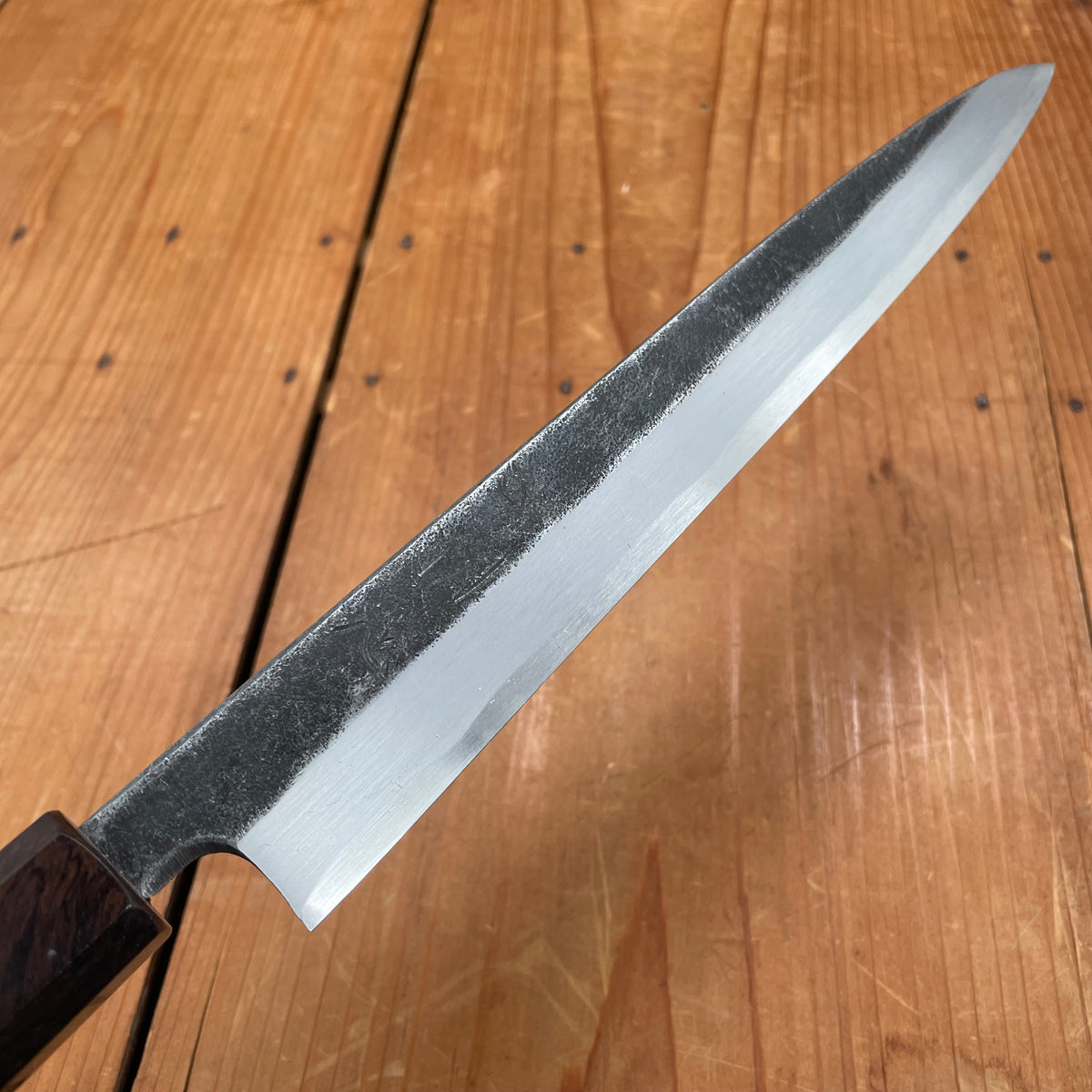
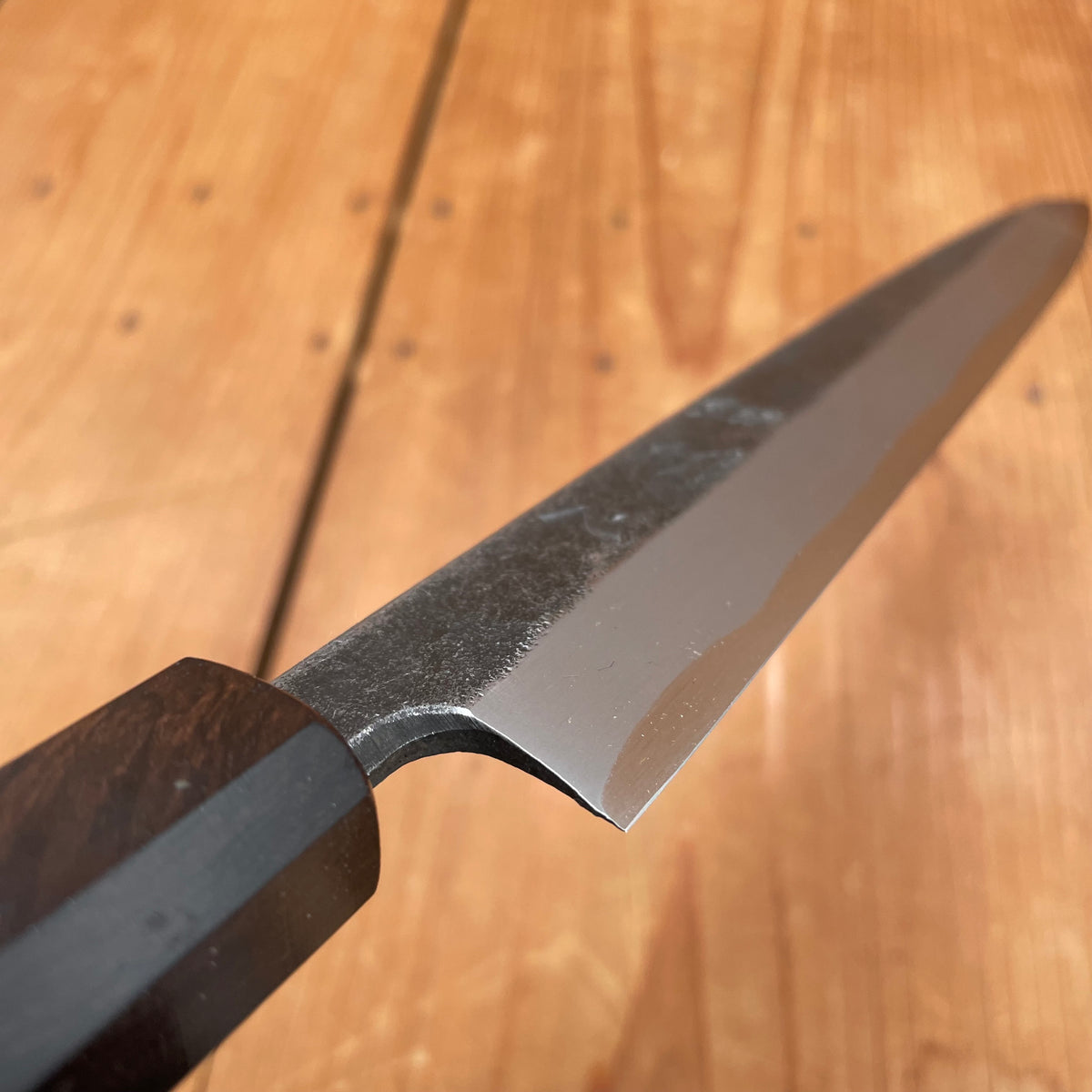
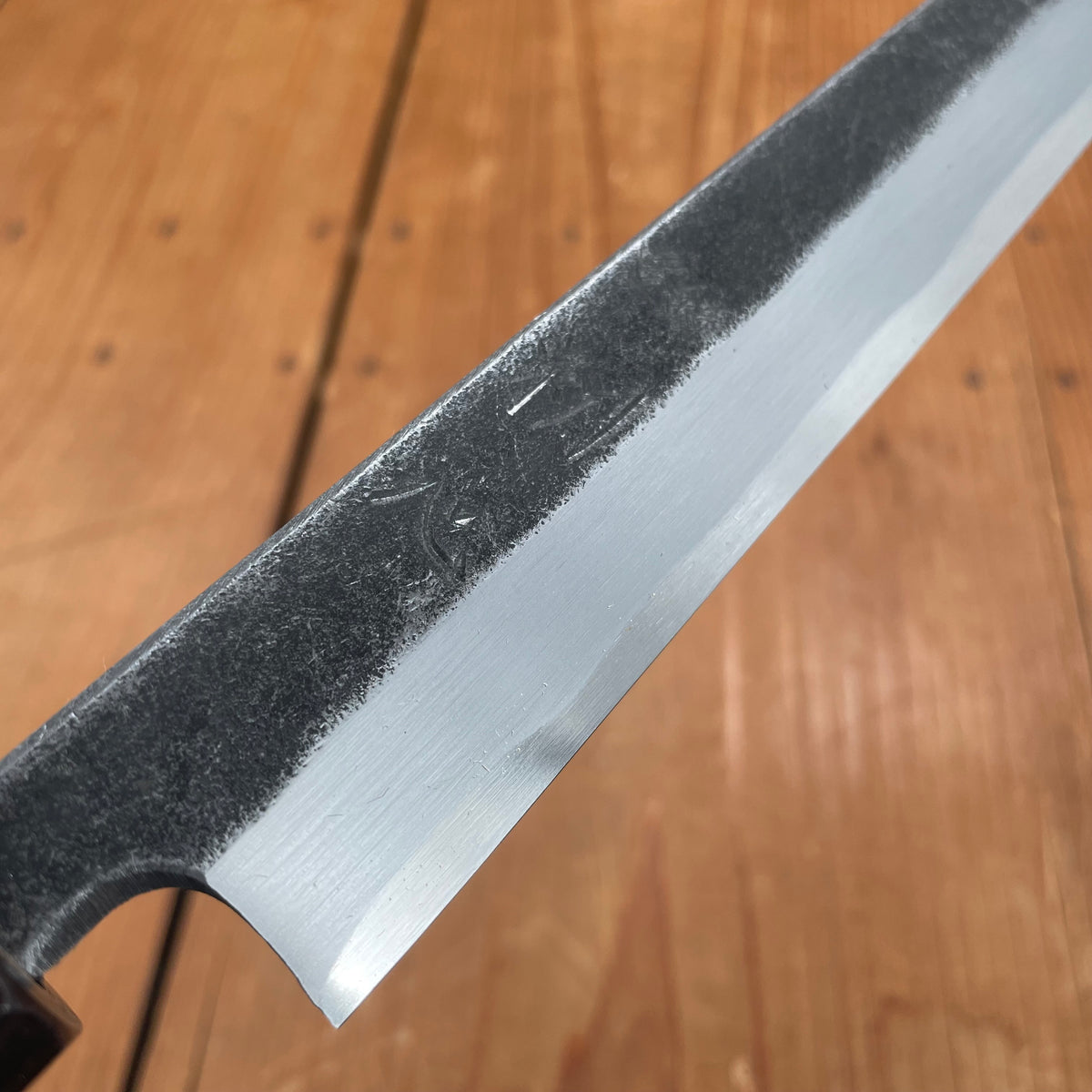
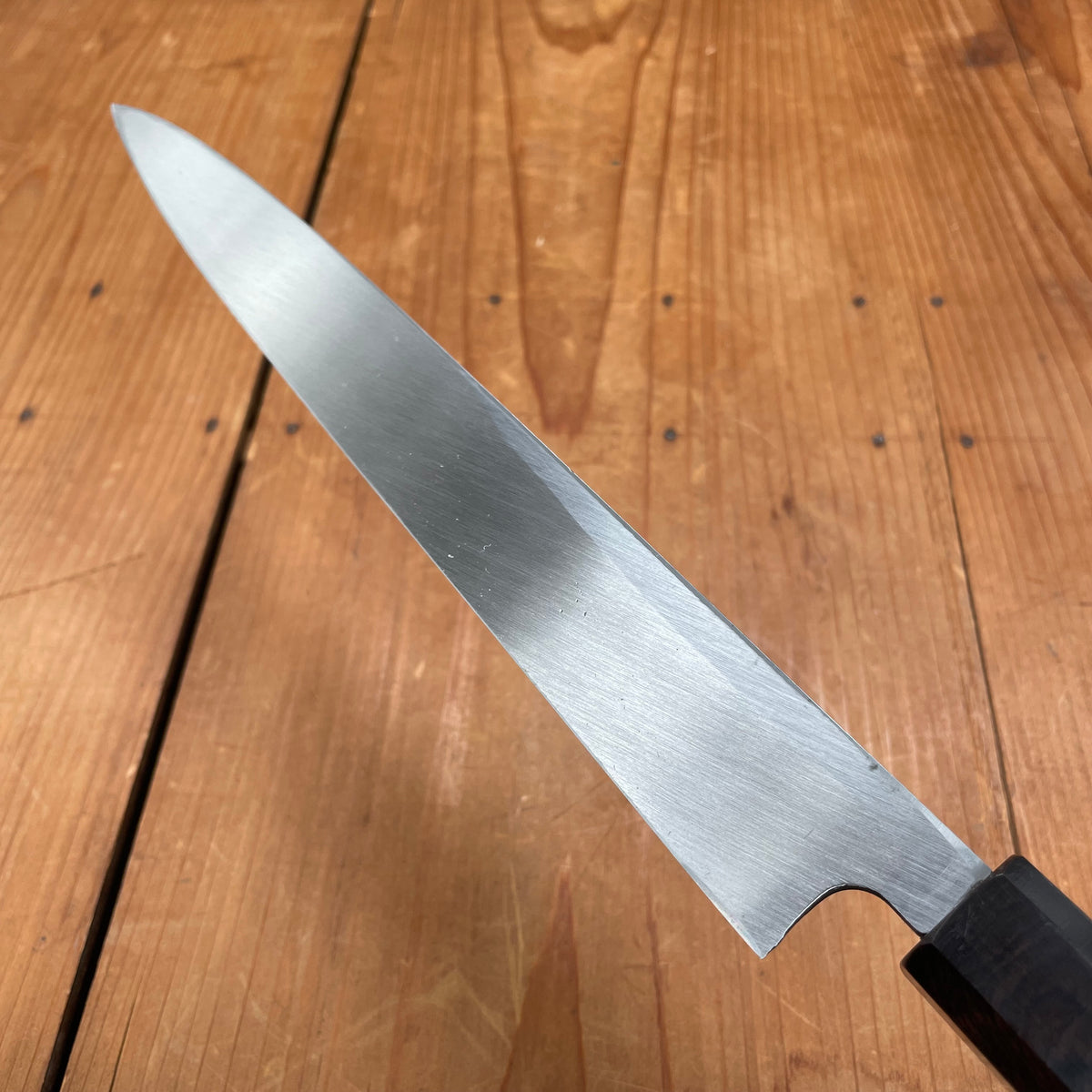
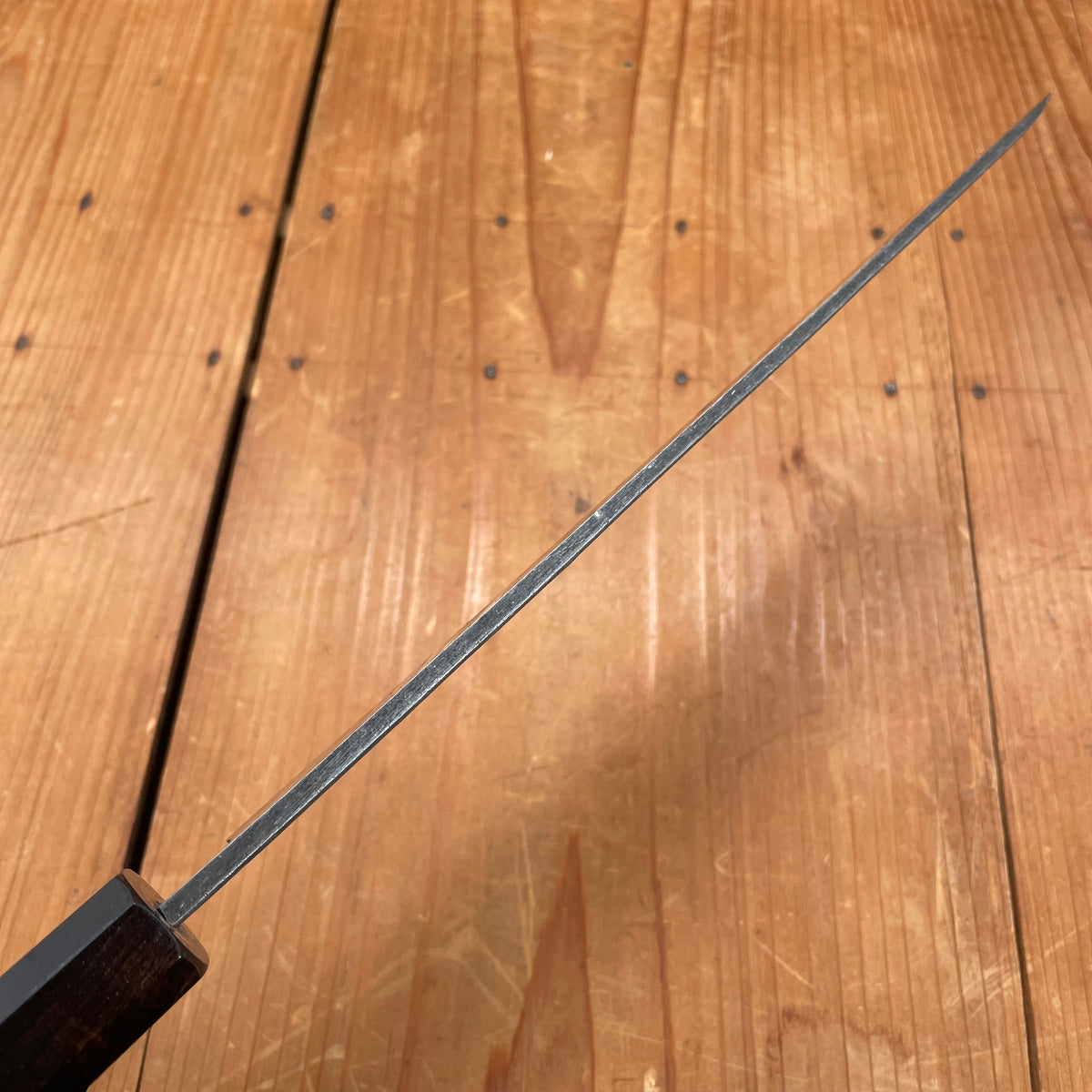
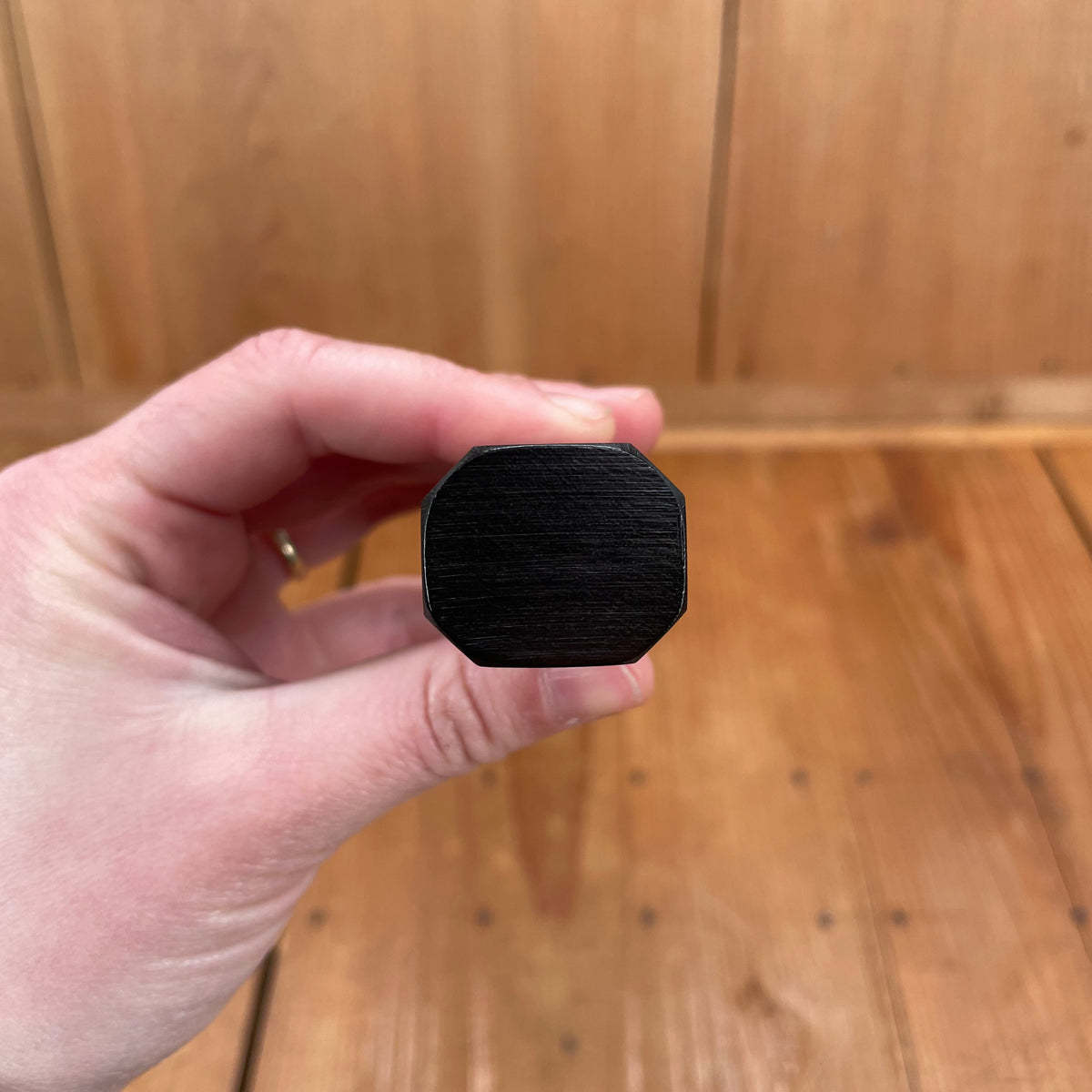
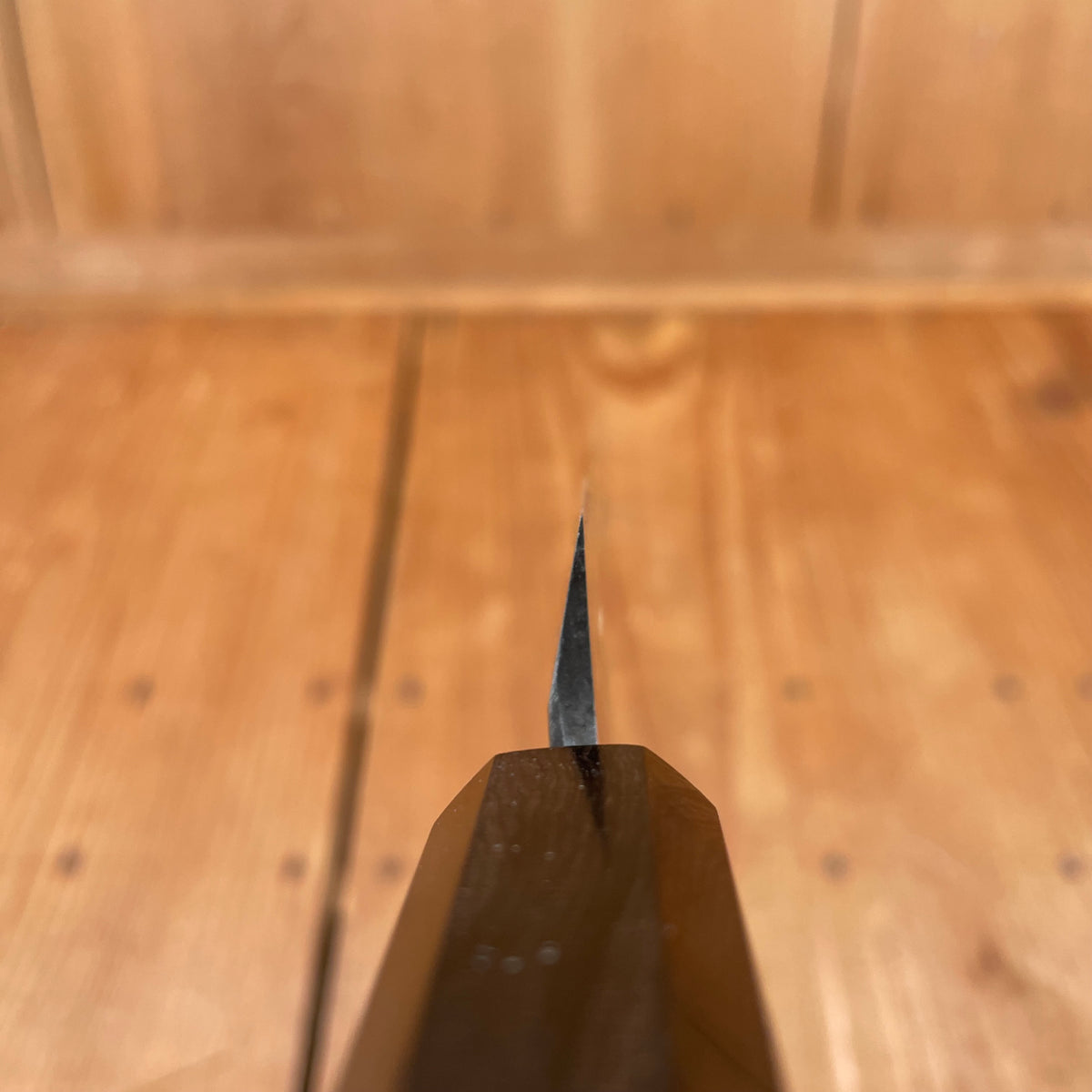
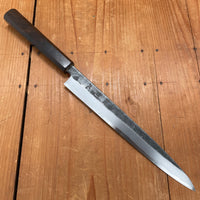
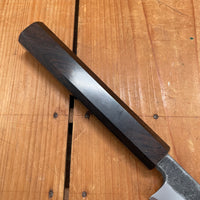
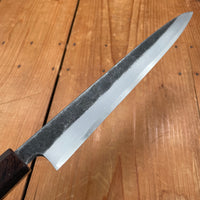
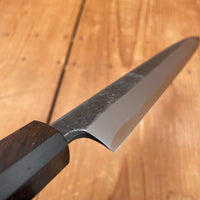
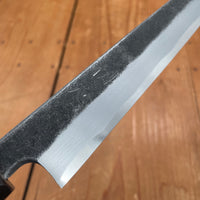
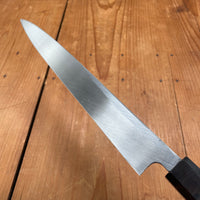
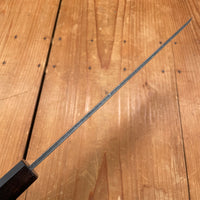
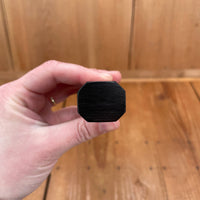
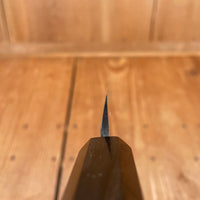
Hatsukokoro Shirasagi 240mm Yanagi Aogami 2 Kurouchi Ebony Handle
-
Regular Price
-
$380.70
-
Sale Price
-
$380.70
-
Regular Price
-
Sale
Sold Out
-
Unit Price
- /per
- Regular Price
- $380.70
- Sale Price
- $380.70
- Regular Price
- Unit Price
- /per
The Shirasagi series is made in Tosa, Japan by Blacksmith Tamura Toru of Testusjin Hamono and sharpened by single-bevel specialist Myojin Tateo, son of Myojin Naohito.
Forged in the Ni-Mai style, a specialized double forging technique that applies soft cladding only to the cutting side of the knife. This technique is not common to the Tosa region.
These have a wide bevel grind with medium thin geometry behind the edge. The finish is not super meticulous, but this helps to keep them affordable.
Aogami has a good edge life in that it cuts well as it dulls, it's edge formation can vary by the smith's treatment of it but we are very encouraged by the edges these take.
Aogami is a reactive carbon steel. It should be dried immediately after use to avoid rusting. It will patina with normal use. No soaking or dishwasher. Rust can be removed with a light abrasive.
Brand: HatsukokoroSmith: Tamura Toru
Sharpener: Myojin Tateo
Producing Area: Tosa, Japan
Profile: Yanagi
Size: 240mm
Steel Type: Ni-mai Carbon Steel
Steel: Aogami 2
Handle: Ebony Handle
Total Length: 389mm
Edge Length: 233mm
Handle to Tip Length: 245mm
Blade Height: 31mm
Thickness: 3.8mm
Handle Length: 144mm
Weight: 200g
Hand Orientation: Right-Handed
This is a carbon steel knife. Carbon steel is expected to develop a dark patina with use. It needs to be hand washed and dried immediately after use. Do not air dry. Do not put it in the dishwasher. Long exposure to moisture and debris will result in rust. Any rust development should be removed with a light abrasive.
Twisting, scraping, and heavy use, as well as use on hard and very dense objects can lead to edge damage. Use on a quality wooden cutting board will help the knife stay sharper for longer. Use on hard surfaces like plates and bamboo will reduce the edge life and can result in edge damage. Special attention needs to be taken to prevent edge damage. Scraping, twisting and forceful as well as using on hard or very dense foods can result in chipping.
We recommend hand sharpening on whetstones. We have found that most Japanese knives perform best at a finer finish starting around 4000. Avoid pull through sharpeners and non-water cooled mechanized sharpening. Ceramic honing rods are preferred.
Recently Viewed
About Bernal Cutlery
We are a full-service cutlery shop offering sharpening services, Japanese and Western culinary knives, vintage knives, outdoor, pocket and craft knives, cooking tools and accessories. We also offer knife skills and sharpening classes, and more.
We are proud to serve kitchen professionals, knife enthusiasts and home cooks alike. Located in the Mission District of San Francisco, California.
766 Valencia Street, SF, CA 94110
1 Ferry Building, Ste. 26, SF, CA 94110
